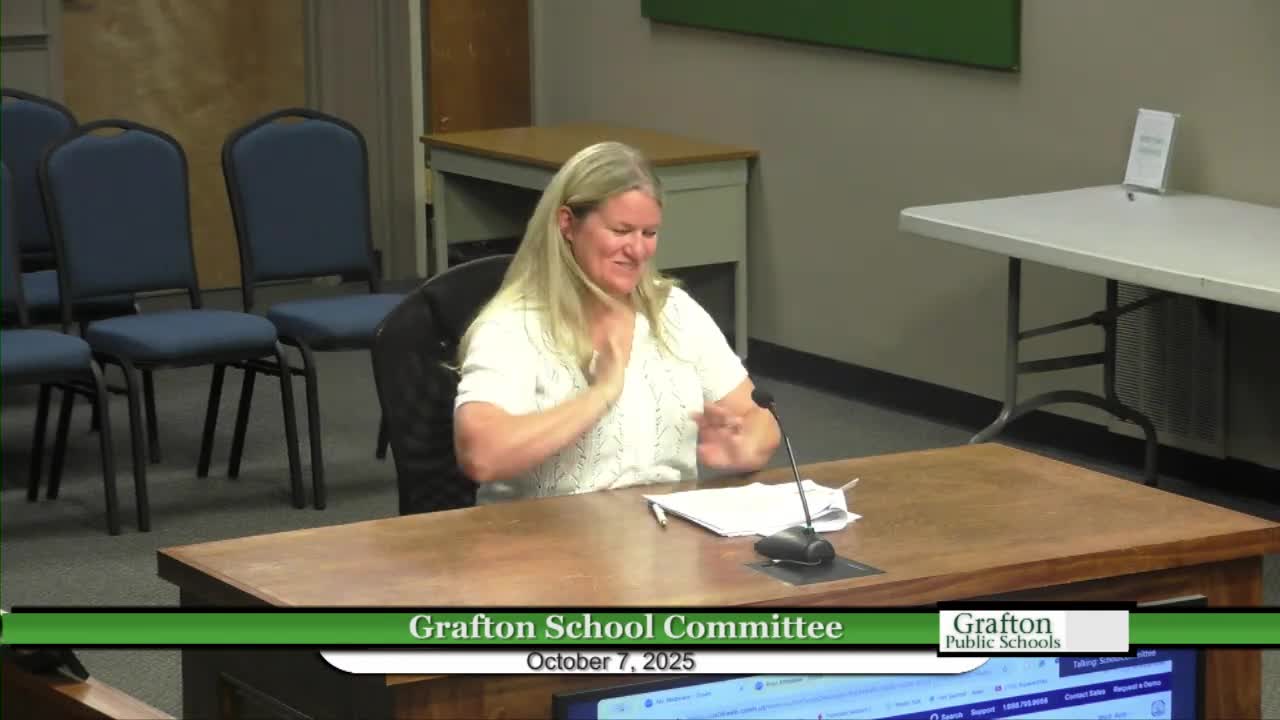Grafton begins FY27 budget planning; quarter‑one update adds Chapter 70 funds to special‑education tuition line
Get AI-powered insights, summaries, and transcripts
Subscribe
Summary
Finance Director Kathleen Lungarini told the School Committee the district will use a performance‑based budgeting process for FY27 and reported a late spring increase of $273,835 in Chapter 70 funding added to special-education out‑of‑district tuition; committee asked for grant spending plans broken down by cost center.
At the Oct. 7 Grafton School Committee meeting, Kathleen Lungarini, finance director for Grafton Public Schools, said the district has begun developing the fiscal year 2027 budget using a "performance‑based budgeting" approach and will meet with principals and department heads to review historical spending and prioritize funding. Lungarini said the FY27 process will proceed on the timeline previously presented and that the district plans to prepare the full budget for committee presentation rather than piecemeal public presentations. "We are underway," she told committee members, explaining that each school and department will review what is working and what can be trimmed. Turning to the fiscal year 2026 quarter‑one report (July 1–Sept. 30), Lungarini said the packet presented a simplified summary: total salary spending in quarter one was about $5.2 million and non‑salary spending about $2.2 million, with encumbrances listed separately as planned but not yet expended funds. She explained the quarter‑one reporting uses DESE function codes and that her office can provide line‑by‑line detail on request. Lungarini reported a late spring budget update: the district received an additional $273,835 in Chapter 70 state funding that was added to the special‑education budget for out‑of‑district tuition. She also reported a $27,000 in‑budget shift from a non‑salary line; the updated quarter‑one starting figure she cited was $9,869,644. Committee members asked that the updated figures be posted to the district website; Lungarini said she could do so. Committee members discussed grant reporting and the district’s grants policy. The committee asked for entitlement grants (IDEA, Title grants) to be presented at the start of the year with a spending plan broken down by the same cost‑center coding used in the district budget. Lungarini said the state grant system already produces breakdowns and that she will print and present the cost‑center detail at the next meeting. She said private or teacher‑written grants received through the year could be presented to the committee in separate memos for acceptance. Members also discussed audit and warrant procedures. Lungarini said the town conducts an annual audit; the district’s contracted auditor produces the end‑of‑year report for DESE and typically provides a full report in March. On warrants (payments), the committee discussed historical practice of signing each warrant versus designating a single committee member to sign; Lungarini said the district designates one committee member to sign warrants and that signed warrants can be placed in the public drive folder for committee review rather than voted on at each meeting. The committee took one finance‑related vote during the meeting: a motion to accept warrants 12, 13 and 14 (and related drive items) was made and approved. The meeting packet also included a motion naming a delegate to the Massachusetts Association of School Committees (MASC) delegate assembly; Rebecca Soko was nominated and confirmed as the committee’s delegate. Policies requiring second readings (homework policy IKB and public solicitations policy KHE) were brought forward later in the meeting and received second readings and committee approval. Lungarini said the administration will continue to monitor spending through the year and will provide detailed grant cost‑center breakdowns and the audit report when available. The budget development process will inform decisions during the next several months as the district prepares the FY27 spending plan.
